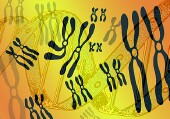
WEDNESDAY, Feb. 9 (HealthDay News) — The “core pathway” that causes declining health due to aging has apparently been identified by researchers.
Studying mice in a laboratory setting, they found that malfunctioning telomeres are the basic cause of age-related health problems such as declining energy levels, metabolic disorders such as diabetes, and the failure of the heart and other organs.
Telomeres are the end-caps of chromosomes that protect against DNA damage. The telomeres become shortened and frayed as cells reach their pre-determined limit on the number of times they can divide. When this happens to telomeres, the ends of the chromosomes become vulnerable to increased rates of unrepaired DNA damage, explained the team at the Dana-Farber Cancer Institute in Boston.
The accumulation of damaged DNA causes cells to activate a gene called p53, which tells cells to either rest until the damage can be repaired or to self-destruct.
The study appears online Feb. 9 in the journal Nature.
“What we have found is the core pathway of aging connecting several age-related biological processes previously viewed as independent of each other,” senior author Dr. Ronald A. DePinho said in a Dana-Farber news release.
This research was conducted in mice, but the “findings bear strong relevance to human aging as this core pathway can be directly linked to virtually all known genes involved in aging as well as current targeted therapies designed to mitigate the toll of aging on health,” said DePinho, who is director of the Belfer Institute for Applied Cancer Science at Dana-Farber.
More information
The AGS Foundation for Health in Aging offers a guide for healthy aging.

